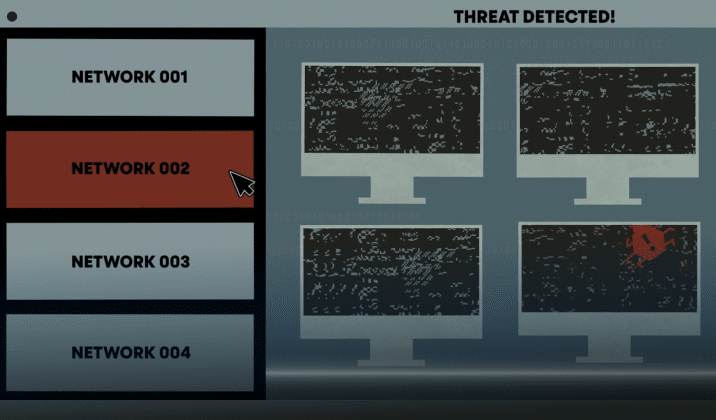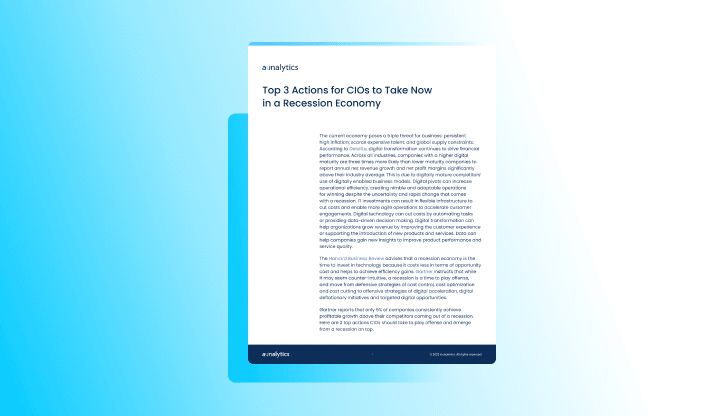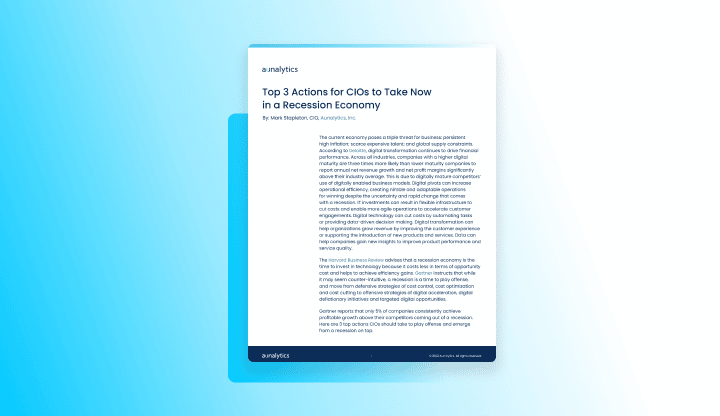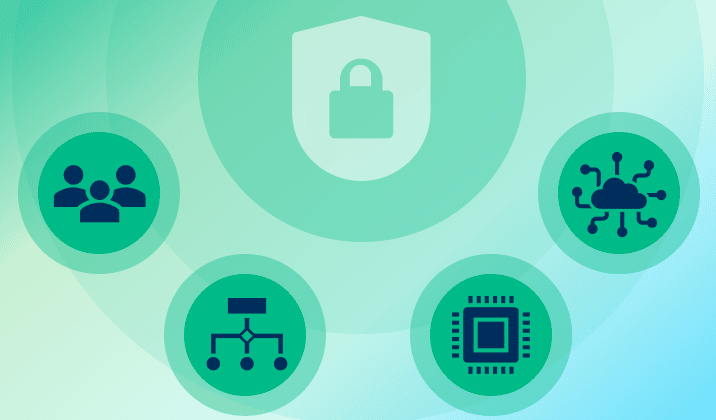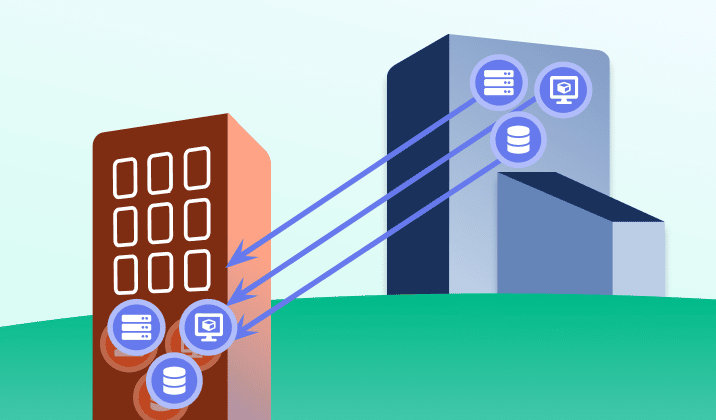Bridging the Mid-Market Talent Gap for Digital Transformation
Bridging the Mid-Market Talent Gap for Digital Transformation
To achieve business value from data technology investments, mid-market companies need the right technical expertise and talent. Yet many mid-market firms push this onto their IT manager, assuming that since it is technology related, IT has it. This is a mistake because most IT departments do not have time for data analytics. They are busy full time keeping company systems stable and secure, and providing support to your team members. This by necessity results in IT deprioritizing data queries over crucial cybersecurity attack prevention. Business analysts and executives get frustrated waiting for data query results, and the data is stale or the business opportunity has passed by the time query results are in.

But even if your IT team had time for it, it still is a mistake to rely on traditional technology administrators for data analytics success. This is unless your IT department has expertise across a wide range of skill sets, from cloud architecture, database engineering, master data management, data quality, data profiling, and data cleansing. What’s more, your IT manager would need to have command over data integration, data ingestion, data preparation, data security, regulatory compliance, data science, and building pipelines of data ready for executive reporting from multiple cloud and on premises environments.
When you read this laundry list of needs, it becomes clear that most mid-market IT departments lack the specialized experts needed to derive business value from their data. Unlike larger enterprises that have the resources to hire skilled staff for these roles, the midsize organization requires another option that provides access to the right tools, resources, and support. One that integrates, enriches and is trained in utilizing AI, machine learning, and predictive analytics to achieve more useful results.
Achieving Digital Transformation
Digital transformation has been defined by some as the integration of digital technology into all areas of a business, fundamentally changing how employees operate and deliver value to customers. Some of the challenges midsize businesses have with building an internal team to initiate this concept are employee pushback, lack of expertise to lead digitization initiatives, improper organizational structure, the absence of a digitization strategy and limited budget. As an alternative to building an internal operation, a more efficient way for mid-market businesses is to leverage the skillsets of experts by partnering with a consolidated group of experts, leveraging a side-by-side model that couples technology with talent. Look for solution providers that offer the following:
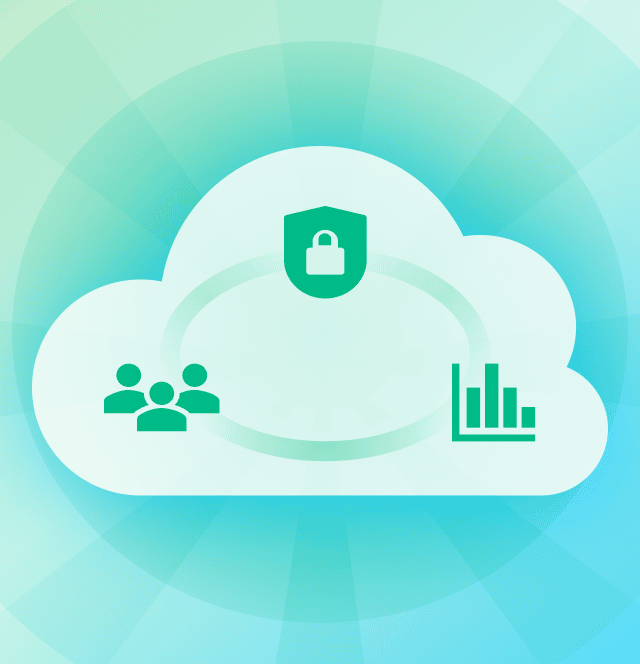
- Powerful cloud data centers paired with engineers skilled in architecting cloud-based applications and processes that better serve critical business requirements. These data centers are optimized for true multi-tenancy, built on seamlessly integrated hardware and software, offer business-driven configurability, world-class security and performant systems.
- Active Monitoring and Thoroughly Integrated Security. Monitoring and security should be pervasive across system infrastructure to defend against cyberattacks and provide remediation when required. Business customers will also expect full-time monitoring and on-demand help desk to address unexpected events. The data management platform underpinning applications should be monitored by experienced data engineers with success in building data warehouses, data lakes, and data pipes. They should also be able to integrate, cleanse, and transform data into decision-ready and analytics-ready business information.
- High ROI Business Insights that Drive Results. Data analytics investments need to provide real business value by giving actionable insights and finding opportunities within your data. With this in mind, data analytics should include access to data scientists and business analysts versed in your industry. These experts should be equipped to design AI-powered algorithms that answer the most pressing questions based on real-world business challenges.
Mid-Market Data Transformation for Enterprise-Class Results
Ensuring the right mix of hardware, software and resulting services are available to maximize the data center capabilities—and their ability to manage and protect data—is crucial to effective mid-market digital transformation. To compete and drive value, the cloud data center provider must deliver at all levels, with customizable business intelligence solutions powered by an effective data management platform that is secure and compliant. Successful mid-market digital transformation thus requires a shift of responsibilities for infrastructure procurement and maintenance to a third-party provider backed by experienced staff and best-in-class infrastructure.
When implementing a digital transformation project, your company gains from the many benefits this brings, such as a higher return on your IT investment, increased employee and customer experience, and greater business agility. This is further enhanced by leveraging experienced cloud engineers, data engineers, security experts, data scientists, and other highly skilled technical resources—achieving true business value from the investment. And by partnering with experts, your company’s time, resources, and innovation can be focused on its core competencies.
Top 3 Actions for CIOs to Take Now in a Recession Economy
Top 3 Actions for CIOs to Take Now in a Recession Economy
The current economy poses a triple threat for business: persistent high inflation; scarce expensive talent; and global supply constraints. However, there are 3 actions CIOs should take to play offense to emerge from a recession on top.
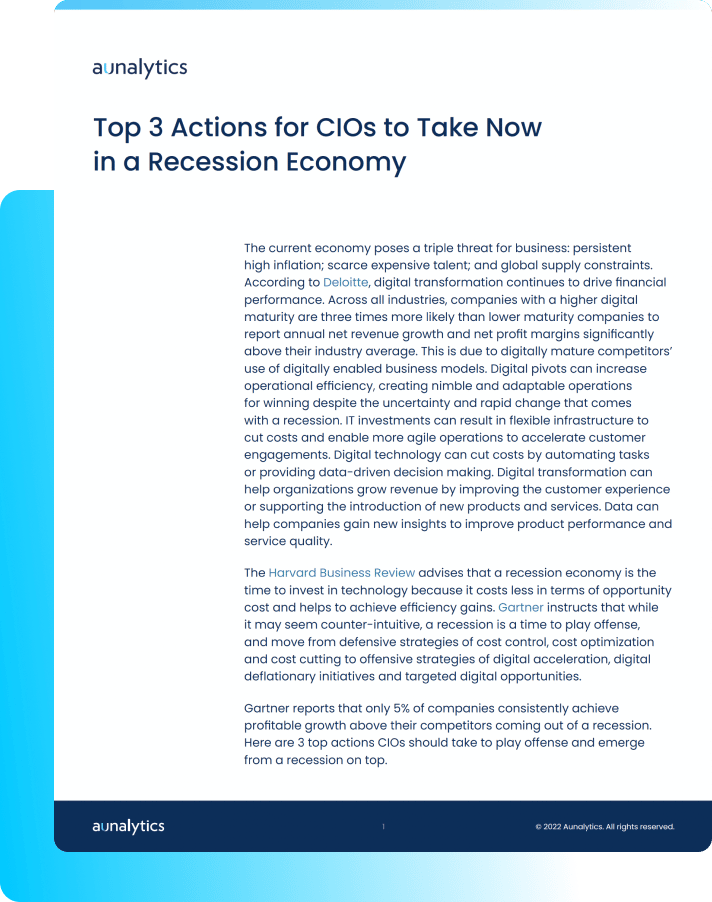
Fill out the form below to receive a link to the article.
Aunalytics is a data platform company. We deliver insights as a service to answer your most important IT and business questions.
Learn More
Top 3 Actions for CIOs to Take Now in a Recession Economy - PDF
Top 3 Actions for CIOs to Take Now in a Recession Economy
The current economy poses a triple threat for business: persistent high inflation; scarce expensive talent; and global supply constraints. However, there are 3 actions CIOs should take to play offense to emerge from a recession on top.
Aunalytics to Showcase Its Portfolio of Managed Services, Enterprise Cloud, and Data Cleansing Solutions for IT Professionals at the 2022 Mi-GMIS Fall Conference in September
Leading Data Management and Analytics Company Provides the Tools Michigan IT Pros Need to Improve Operational Efficiencies and Provide the Highest Levels of IT Security to Their Organizations
South Bend, IN (September 15, 2022) - Aunalytics, a leading data management and analytics company delivering Insights-as-a-Service for mid-market businesses, announced today it will participate in the 2022 Mi-GMIS Fall Conference on September 18-21 in Boyne Falls, Michigan. The event is hosted by the Michigan Government Management Information Sciences and will bring together government IT professionals across the state of Michigan whose role is to meet the informational needs of their organization’s employees and to play an instrumental part in achieving organizational goals using IT resources. The conference program is designed to keep IT professionals abreast of best practices and industry trends, and how they can be applied to their organizations productively and economically.
Aunalytics will feature its managed services, enterprise cloud, and data cleansing portfolio. The company provides IT and security expertise to mid-market businesses in the areas of cities and local government, financial services, healthcare, manufacturing and professional services. The company’s Secure Managed Services offering combines mission critical IT services leveraging zero-trust end-to-end security to ensure data is protected regardless of a user’s location. Aunalytics provides managed components that offer stability and security, and its next-generation managed services offering is powered by a data platform that provides data-driven IT answers and embedded security that focuses on people and access.
The full suite of managed IT and integrated security services empowers businesses with a complete, all-encompassing approach that includes 24/7/365 monitoring and management, a synchronized network security platform, workstation and server patching, internet protection, email filtering and security, Office 365 management and security, multi-factor authentication, data and device encryption management, and security awareness training.
The company delivers advanced security for defending against modern threats through a team of engineers and analysts with expert skills and toolsets and, in regulated industries, Aunalytics provides the additional technology and controls required to manage risk. Its team of experts is dedicated to analyzing ever-changing rules and regulations and helping users to create processes and policies for data protection and meet compliance requirements within those industries that are regulated.
Aunalytics’ Enterprise Cloud offering is comprised of infrastructure solutions that provide a highly redundant and scalable platform for hosting servers, data, analytics and applications at any performance level. With the Aunalytics® Cloud Storage and Compute solution, users are assured the highest levels of security, accessibility, expertise, scalability, and savings. Aunalytics’ data centers, located in Northern Indiana and Southwest Michigan, meet the most rigorous standards for security, weather protection, temperature and humidity controls, fire suppression and more.
The company’s cloud offering has achieved Federal Risk and Authorization Management Program (FedRAMP) Ready status and is actively working toward FedRAMP certification. Certified cloud-based products help U.S. federal agencies meet increasingly complex regulations and defend against cybersecurity threats, prevent data loss, enforce compliance, and protect agency domains.
“Government IT professionals across the state of Michigan face similar challenges and opportunities, and are eager for real-world knowledge about emerging technology and management solutions,” said Steven Burdick, Vice President Sales – Cloud, Aunalytics. “Our portfolio of managed services, enterprise cloud, and data cleansing solutions provides the tools they need to improve operational efficiencies and provide the highest levels of IT security. We look forward to meeting with IT pros at the Mi-GMIS Fall Conference and demonstrating how Aunalytics can help them meet the needs of employees and advance their organizations’ goals.”
Tweet this: .@Aunalytics to Showcase Its Portfolio of Managed Services, Enterprise Cloud, and Data Cleansing Solutions for IT Professionals at the 2022 Mi-GMIS Fall Conference in September #Informationtechnology #Managedservices #Enterprisecloud #Datacleansing #Dataplatform #Dataintegration #Dataaccuracy #Digitaltransformation #ITsecurity #Securitytechnology
About Aunalytics
Aunalytics is a leading data management and analytics company delivering Insights-as-a-Service for mid-sized businesses and enterprises. Selected for the prestigious Inc. 5000 list for two consecutive years as one of the nation’s fastest growing companies, Aunalytics offers managed IT services and managed analytics services, private cloud services, and a private cloud-native data platform for data management and analytics. The platform is built for universal data access, advanced analytics and AI – unifying distributed data silos into a single source of truth for highly accurate, actionable business information. Its DaybreakTM industry intelligent data mart combined with the power of the Aunalytics data platform provides industry-specific data models with built-in queries and AI for accurate mission-critical insights. To solve the talent gap that so many mid-sized businesses and enterprises located in secondary markets face, Aunalytics’ side-by-side digital transformation model provides the technical talent needed for data management and analytics success in addition to its innovative technologies and tools. To learn more contact us at +1 855-799-DATA or visit Aunalytics at https://www.aunalytics.com or on Twitter and LinkedIn.
PR Contact
Denise Nelson
The Ventana Group for Aunalytics
(925) 858-5198
dnelson@theventanagroup.com
4 Questions Mid-market Companies Should Ask Themselves About Data Protection
4 Questions Mid-market Companies Should Ask Themselves About Data Protection
 When the working world went remote due to the COVID-19 pandemic, many never returned to the office. This created new data-security challenges for many businesses, with an increasing amount of sensitive data now being stowed in the cloud, and workers continuing to access company data from off-site locations.
When the working world went remote due to the COVID-19 pandemic, many never returned to the office. This created new data-security challenges for many businesses, with an increasing amount of sensitive data now being stowed in the cloud, and workers continuing to access company data from off-site locations.
How safe is cloud security, which now often relies on “zero trust” security principles based on a user’s location rather than user credentials? While some worry that cloud security is less reliable than on-premise security, that’s not actually the case, particularly for mid-market businesses. The fact is that your data is actually more secure in a remote data center managed by security experts than by your in-house IT team.
You may feel a false sense of security by having your IT department guard your servers in a closet — but this strategy is extremely risky when it comes to data protection. It’s not standard for mid-market IT departments to possess expert skills in cloud security and data security, which are needed to properly safeguard data. Many mid-market companies, particularly those not in highly regulated industries, do not currently have Security Operations Centers.

To read more, please fill out the form below:
Learn More
Enterprise Cloud Solutions Allow Businesses to Scale and Thrive
 As your organization grows, so does the need for the benefits cloud computing provides. To stay ahead of the competition, your company needs to seize every opportunity in its sight. Enterprise cloud solutions are essential for increasing business agility and further bolstering chances of success.
As your organization grows, so does the need for the benefits cloud computing provides. To stay ahead of the competition, your company needs to seize every opportunity in its sight. Enterprise cloud solutions are essential for increasing business agility and further bolstering chances of success.
Paul Delory, Senior Director Analyst at Gartner says, “Cloud adoption accelerated rapidly during the pandemic and will accelerate further in the years to come.” There are several new advancements in the global IT infrastructure that have made deployment easier, which enables use cases which were previously considered to be unfeasible.
To get the most out of cloud storage, however, you need to find a cloud computing solution that fits your company’s needs. An enterprise cloud solution is a natural progression for any organization that has outgrown an onsite, physical server. A switch to a cloud computing solution can be compared to switching from everyone in an organization from owning a basic car to everyone in your organization carpooling in an efficient high-performance vehicle. Everyone gets to pool the resource and share it, but can also maintain their individuality.
A customer does not need to buy a physical or cloud server—instead they buy CPU, RAM, and storage components to satisfy their data and computational needs. These solutions often have scalability factored in, and, as you have greater needs as you grow, cloud providers are able to open more CPU, RAM, and storage as needed. For any organization, this option is significantly more feasible than having to buy double or triple the CPU and RAM for a physical server that they have on site. Our Enterprise Cloud offers server space in a shared environment that partitions a particular user’s CPU and RAM needs, alongside other user’s CPU and RAM needs, into a single, larger, combined CPU provisioning—and a single, larger, combined RAM bucket that are both Enterprise-level.
Aunalytics has high performance infrastructure solutions that provide scalable platforms for all your needs—including hosting servers, data, and applications at any performance level you’ll need. With this elastic infrastructure, we can support your ever-expanding needs and ensure your business is able to leverage the most robust cloud computing environment. Our hosting solutions are backed by our expertise in data, analytics, machine learning, and more.
To ensure the highest level of reliability, we host our Enterprise Cloud solution through multiple geographically diverse company-owned data centers, which provides you with a highly redundant and scalable platform. This cloud solution is intended to keep your data extremely safe and accessible and is scalable to handle any level of I/O intensive workloads.
Access to a strong cloud computing and storage solutions enable you to experience true efficiency as you manage, run, and secure applications across multiple devices. To increase your business’s agility, and meet your needs and your clients’ expectations, consider using a cloud computing solution and leverage the benefits of a consistent infrastructure with the ability to dynamically adjust to your requirements.
4 Questions Mid-market Companies Should Ask Themselves About Data Protection
4 Questions Mid-market Companies Should Ask Themselves About Data Protection
 When the working world went remote due to the COVID-19 pandemic, many never returned to the office. This created new data-security challenges for many businesses, with an increasing amount of sensitive data now being stowed in the cloud, and workers continuing to access company data from off-site locations.
When the working world went remote due to the COVID-19 pandemic, many never returned to the office. This created new data-security challenges for many businesses, with an increasing amount of sensitive data now being stowed in the cloud, and workers continuing to access company data from off-site locations.
How safe is cloud security, which now often relies on “zero trust” security principles based on a user’s location rather than user credentials? While some worry that cloud security is less reliable than on-premise security, that’s not actually the case, particularly for mid-market businesses. The fact is that your data is actually more secure in a remote data center managed by security experts than by your in-house IT team.
You may feel a false sense of security by having your IT department guard your servers in a closet — but this strategy is extremely risky when it comes to data protection. It’s not standard for mid-market IT departments to possess expert skills in cloud security and data security, which are needed to properly safeguard data. Many mid-market companies, particularly those not in highly regulated industries, do not currently have Security Operations Centers.
What’s more, it came to light at the end of 2021 that cyber-insurance renewals are becoming at times prohibitively expensive for all industries due to the exponential increase in cyber-attacks seen last year. The only way for mid-market companies in all industries to lower cyber-insurance premiums and ensure coverage is to implement enhanced data security measures.
Since data protection has become the most prevalent challenge in the cybersecurity market, it’s no surprise to see that according to Insights for Professionals, data protection is the main focus in 2022 for 85 percent of businesses surveyed; 37 percent plan to invest up to $500,000 on data protection in 2022, and 31 percent plan to invest more than $500,000 on data protection over the next 18 months. McKinsey also reports that 85 percent of midsize enterprises plan to boost their IT security spend until 2023.
All-Time High Cybercrime
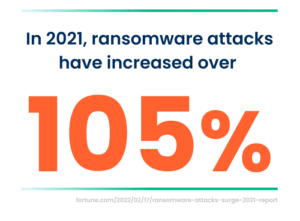 Still, it would be misleading to imply that cloud security comes with no challenges. One of the biggest ongoing concerns are ransomware attacks, which increased over 105 percent in 2021. Cybercriminals continue to attain new levels of sophistication, with payment demands skyrocketing into tens of millions of dollars. According to McKinsey, the costs related to cybercrime will continue to ascend in the coming years, with a 15 percent yearly increase leading to cybercrime costs reaching $10.5 trillion a year in 2025. Looking ahead over the next decade, by 2031, Cybersecurity Ventures estimates ransomware costs alone should reach $265 billion.
Still, it would be misleading to imply that cloud security comes with no challenges. One of the biggest ongoing concerns are ransomware attacks, which increased over 105 percent in 2021. Cybercriminals continue to attain new levels of sophistication, with payment demands skyrocketing into tens of millions of dollars. According to McKinsey, the costs related to cybercrime will continue to ascend in the coming years, with a 15 percent yearly increase leading to cybercrime costs reaching $10.5 trillion a year in 2025. Looking ahead over the next decade, by 2031, Cybersecurity Ventures estimates ransomware costs alone should reach $265 billion.
McKinsey reports that there are multiple motivations for these attacks, headed by the fact that pandemic-weary companies have become ripe for security vulnerabilities. Also, as advancing digitization continues to drive connectivity and employees now log in from anywhere — including unsecured home networks — it makes life easier for ransomware hackers. The traditional smash and grab approach is now being replaced with bad actors “dwelling” undetected within victims’ environments, which gives cybercriminals the lay of the land in understanding where the highest value information resides before selling it to the highest bidder.
Another motivation for the continued attacks is their success: as more companies are forced to pay ransoms, hackers are further incentivized to build on their well-paid victories and continue innovating on this lucrative threat. Specific sectors are particularly at risk; keep in mind that in the U.S., supply-chain attacks rose 42 percent in Q1 of 2021, victimizing as many as 7 million people, while McKinsey shared that “security threats against industrial control systems and operational technology more than tripled in 2020.” The war in Ukraine has taught us lessons about attacks compromising infrastructure, utilities and government that can debilitate nations and be weaponized.
Paying Up
These massive numbers can seem overwhelming, and can also make it difficult to tell how much a ransomware attack can affect an individual company. To give you some perspective, consider these stats:
- NPR reported that Colonial Pipeline paid a $4.4 million ransom after the company shut down operations.
- CNBC reported that global meat producer JBS paid ransomware hackers $11 million.
- Insider reported that global insurance provider CNA Financial forked over a reported mind-blowing $40 million post-cyber-attack.
- The Washington Post reported that a ransomware attack on U.S. software provider Kaseya targeted the firm’s remote-computer-management tool and endangered up to 2,000 companies globally.
These costs are also just the tip of the iceberg for the companies victimized by ransomware hackers. Additional costs of such an attack include everything from paying third parties (like legal, PR, and negotiation firms), not to mention the opportunity costs of having executives, staff, and teams disconnected from their day-to-day roles for weeks or months to deal with the attack’s aftermath. Perhaps the biggest unaccounted-for expense is the resulting lost revenue.
Ask These 4 Questions
What can mid-market companies do in the face of these threats to their data’s safety? They should focus on strategies that address ransomware prevention, preparation, response, and recovery. Since this is an ongoing journey, threats continue to evolve and improve — so it’s critical to keep up to date with new threats of increasing sophistication, while being ready with cybersecurity strategies and best practices. The goal is to continue to build cyber maturity that creates a resilient approach. You may not be able to stop attacks from occurring, but when they do, they won’t have the same impact if you’ve prepared in this way.
As a starting point, these are four questions that every mid-market company should ask itself to determine the organization’s readiness for data defense:
- When it comes to our people, do we have security focused IT leadership, trained cloud security experts, and data security experts?
- When it comes to our process, do we have defined IT security processes for proactively managing the security posture of our environments?
- When it comes to our technology, are we 100 percent confident in our security tech and our ability to actively monitor and detect threats around the clock?
- When it comes to our cloud architecture, are we confident that it allows for scalability without sacrificing security assurances?
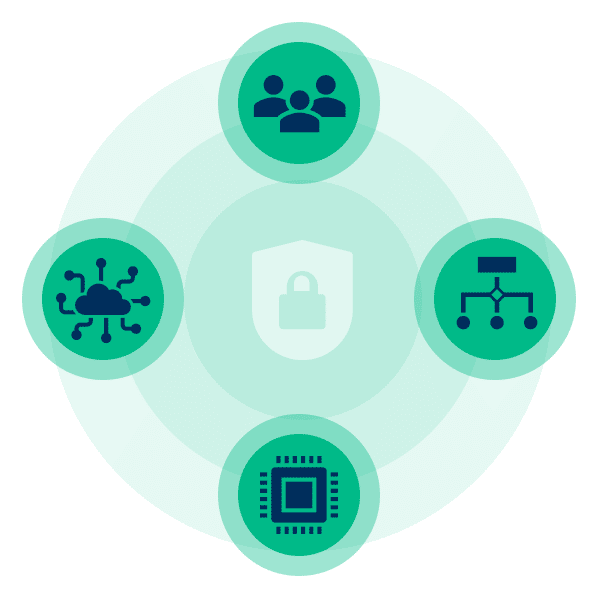
If the answer is “no” or “I don’t know” to any of these questions, it is time to get your house in order — you are at risk. To stay alive, compete, and drive value, mid-market companies should shift their focus to data analytics, data management, security, and compliance. This requires a cloud-based data center, a cloud-native data management platform, and cloud-native analytics. Ensuring the right infrastructure to maximize the capabilities of data centers — and how they are able to manage and store data — is crucial to effective mid-market digital transformation.
Aunalytics Selected for Inc. Magazine’s 5000 List of the Nation’s Fastest-growing Private Companies for Two Years in a Row
Leading Cloud Data Management & Analytics Company Demonstrates Continued Momentum With its Focus on Helping Mid-market Businesses Accelerate Their Digital Transformation
South Bend, IN (August 18, 2022) - Aunalytics, a leading data management and analytics company delivering Insights-as-a-Service for mid-market businesses, has been named by Inc. magazine as one of the nation’s fastest-growing private companies included in its annual Inc. 5000 list. This marks the second consecutive year that Aunalytics earned a spot on the prestigious ranking, representing a one-of-a-kind look at the most successful companies within the economy’s most dynamic segment—its independent businesses. Facebook, Chobani, Under Armour, Microsoft, Patagonia, and many other well-known names gained their first national exposure as honorees on the Inc. 5000.
“The accomplishment of building one of the fastest-growing companies in the U.S., in light of recent economic roadblocks, cannot be overstated,” said Scott Omelianuk, editor-in-chief of Inc. “Inc. is thrilled to honor the companies that have established themselves through innovation, hard work, and rising to the challenges of today.”
The companies on the 2022 Inc. 5000 have not only been successful, but have also demonstrated resilience amid supply chain woes, labor shortages, and the ongoing impact of Covid-19. Among the top 500, the average median three-year revenue growth rate soared to 2,144 percent. Together, those companies added more than 68,394 jobs over the past three years.
Aunalytics offers a robust, cloud-native platform built to deliver enterprise data management, powerful analytics, and AI-driven answers. From the onset, Aunalytics has been dedicated to empowering enterprise and mid-sized businesses located in secondary and tertiary markets, with advanced data management and analytics tools. Typically in these markets, the technical talent needed to use, maintain, and achieve value from the solution is scarce. Aunalytics provides its technology as a managed service paired with the expert talent needed to achieve ROI.
The analytics portion of the platform represents Aunalytics’ unique ability to unify all the elements necessary to process data and deliver AI end-to-end, from cloud infrastructure to data acquisition, organization, and machine learning models – all managed and run by Aunalytics as a secure managed service. Aunalytics continues to gain traction in industries such as financial services, healthcare, and manufacturing where companies are challenged with undertaking the digital transformation required to succeed in the modern world.
“We’re thrilled to be selected for the Inc. 5000 two years in a row – this truly demonstrates the accelerated growth Aunalytics has experienced as a result of providing advanced talent and tools that are typically not affordable for mid-market businesses,” said Rich Carlton, President of Aunalytics. “Our goal from the very beginning has been to address the midsize business sector and we remain committed to serving the best interests of our customers in this category because it is so critical for both innovation and the economy.”
Complete results of the Inc. 5000 can be found at www.inc.com/inc5000.
Tweet this: .@Aunalytics Selected for Inc. Magazine’s 5000 List of the Nation’s Fastest-growing Private Companies for Second Consecutive Year #Inc5000 #Dataplatform #Dataanalytics #Dataintegration #Dataaccuracy #AdvancedAnalytics #ArtificialIntelligence #AI #Masterdatamanagement #MDM #DataScientist #MachineLearning #ML #DigitalTransformation #FinancialServices
About Inc.
The world’s most trusted business-media brand, Inc. offers entrepreneurs the knowledge, tools, connections, and community to build great companies. Its award-winning multiplatform content reaches more than 50 million people each month across a variety of channels including websites, newsletters, social media, podcasts, and print. Its prestigious Inc. 5000 list, produced every year since 1982, analyzes company data to recognize the fastest-growing privately held businesses in the United States. The global recognition that comes with inclusion in the 5000 gives the founders of the best businesses an opportunity to engage with an exclusive community of their peers, and the credibility that helps them drive sales and recruit talent. The associated Inc. 5000 Conference & Gala is part of a highly acclaimed portfolio of bespoke events produced by Inc. For more information, visit www.inc.com.
For more information on the Inc. 5000 Conference & Gala, visit https://conference.inc.com/.
About Aunalytics
Aunalytics is a data platform company delivering answers for your business. Aunalytics provides Insights-as-a-Service to answer enterprise and mid-sized companies’ most important IT and business questions. The Aunalytics® cloud-native data platform is built for universal data access, advanced analytics and AI while unifying disparate data silos into a single golden record of accurate, actionable business information. Its DaybreakTM industry intelligent data mart combined with the power of the Aunalytics data platform provides industry-specific data models with built-in queries and AI to ensure access to timely, accurate data and answers to critical business and IT questions. Through its side-by-side digital transformation model, Aunalytics provides on-demand scalable access to technology, data science, and AI experts to seamlessly transform customers’ businesses. To learn more contact us at +1 855-799-DATA or visit Aunalytics at https://www.aunalytics.com or on Twitter and LinkedIn.
PR Contact:
Denise Nelson
The Ventana Group for Aunalytics
(925) 858-5198
dnelson@theventanagroup.com
Aunalytics Extends Its Presence in Greater Columbus Area
Leading Data Platform Provider Joins One Columbus Organization to Help Foster Economic Development in the 11-County Region, and Is a Featured Presenter at a Cybersecurity Forum in Sydney on August 19
South Bend, IN (August 17, 2022) - Aunalytics, a leading data platform company delivering Insights-as-a-Service for mid-market businesses, announced today its membership in One Columbus, the economic development organization for the 11-county Columbus, Ohio region. With an office in Bellefontaine, Aunalytics is committed to contributing its resources to foster the economic well-being of the broader Columbus region.
Working with local and state partners, One Columbus serves as the business location resource for companies across Central Ohio and around the world as they grow, innovate, and compete within the global economy. Its mission is to lead a comprehensive regional growth strategy that develops and attracts the world’s most competitive companies, grows a highly adaptive workforce, prepares its communities for the future, and inspires corporate, academic and public innovation throughout the greater Columbus area.
“As with other regions of the country, the organizations in the Greater Columbus area are interested in increasing their competitive advantage through digital transformation,” said Robert Lizotte, Ohio Local Market Leader for Aunalytics. “As a member of One Columbus, we look forward to demonstrating how this shift can be accomplished in a more secure and efficient way to drive a higher return on business initiatives.”
Aunalytics also announced that its Chief Security Officer, Kerry Vickers, will speak in Sydney, Ohio at the Sydney Shelby Chamber of Commerce cybersecurity forum, “Do You Have a Plan?” on August 19, at 8amET. Vickers is one of nine subject matter experts who will outline the threats and the measures that can be taken to mitigate cyber invasions which occur on a daily basis, to organizations large and small.
Tweet this: .@Aunalytics Extends Its Presence in Greater Columbus Area #Cybersecurity #FinancialServices #Banks #CreditUnions #Dataplatform #DataAnalytics #Dataintegration #Dataaccuracy #AdvancedAnalytics #ArtificialIntelligence #AI #Masterdatamanagement #MDM #DataScientist #MachineLearning #ML #DigitalTransformation #FinancialServices
About Aunalytics
Aunalytics is a data platform company delivering answers for your business. Named a Digital Innovator by analyst firm Intellyx, and selected for the prestigious Inc. 5000 list two years in a row, Aunalytics provides Insights-as-a-Service to answer enterprise and mid-sized companies’ most important IT and business questions. The Aunalytics® cloud-native data platform is built for universal data access, advanced analytics and AI while unifying disparate data silos into a single golden record of accurate, actionable business information. Its DaybreakTM industry intelligent data mart combined with the power of the Aunalytics data platform provides industry-specific data models with built-in queries and AI to ensure access to timely, accurate data and answers to critical business and IT questions. Through its side-by-side digital transformation model, Aunalytics provides on-demand scalable access to technology, data science, and AI experts to seamlessly transform customers’ businesses. To learn more contact us at +1 855-799-DATA or visit Aunalytics at https://www.aunalytics.com or on Twitter and LinkedIn.
PR Contact:
Denise Nelson
The Ventana Group for Aunalytics
(925) 858-5198
dnelson@theventanagroup.com
Backup vs Disaster Recovery: What’s the Difference?
Your data is vital for your business to function. Often, companies are not completely confident in what should be a part of their Business Continuity Plan (BCP), and do not understand that they need both data backup and disaster recovery to re-operationalize the business to be covered for outages and disasters.
Backup
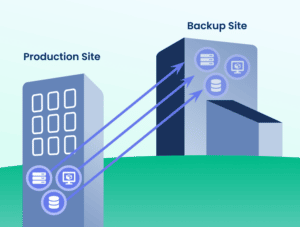 Backup services ensure your data is replicated to a separate, secure location and able to be quickly and easily restored after an outage or disaster event. Many instances of data loss occur due to accidental deletion or corruption, short of an attack or disaster. If you have a backup, what you technically have is a copy of your original data that was last backed up in a virtual or physical location. A backup can be used in case of outage or database failure. It will return data to the last restore point, meaning you may lose some information in the process. Colocation services to store back-ups in multiple separate, secure locations are recommended for resiliency.
Backup services ensure your data is replicated to a separate, secure location and able to be quickly and easily restored after an outage or disaster event. Many instances of data loss occur due to accidental deletion or corruption, short of an attack or disaster. If you have a backup, what you technically have is a copy of your original data that was last backed up in a virtual or physical location. A backup can be used in case of outage or database failure. It will return data to the last restore point, meaning you may lose some information in the process. Colocation services to store back-ups in multiple separate, secure locations are recommended for resiliency.
Disaster Recovery
Disaster recovery services are designed to bring a business back online after a failure at the primary business site. Disaster recovery includes steps to operationalize the data back-ups, and bring back online networks and systems should an attack or outage occur. With a disaster recovery solution in place your organization’s data and the functioning of your IT systems are restored. An all-encompassing Disaster Recovery plan restores business functions and minimizes losses and downtimes. It includes server level and site level restoration. You may have to invest in an entire secondary IT infrastructure unless you have a Disaster Recovery as a Service (DRaaS) provider.
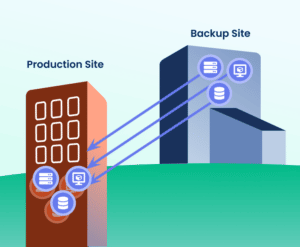 Most midsized institutions do not have a team of disaster recovery experts in house to help them to get their business up and running in case of an unforeseen disaster. Gartner reports that in a recent survey, 86% of IT leaders state that their recovery capabilities meet or exceed CIO expectations, but only 27% reported having a disaster recovery plan in place that included base elements of recovery: formalizing scope, performing a BIA to understand business requirements, and creating detailed recovery procedures. On the other hand, “those with a solid disaster recovery program are 40% more likely to demonstrate a stronger overall resilience posture.” Disaster recovery experts supplement your IT team to restore systems and business operations.
Most midsized institutions do not have a team of disaster recovery experts in house to help them to get their business up and running in case of an unforeseen disaster. Gartner reports that in a recent survey, 86% of IT leaders state that their recovery capabilities meet or exceed CIO expectations, but only 27% reported having a disaster recovery plan in place that included base elements of recovery: formalizing scope, performing a BIA to understand business requirements, and creating detailed recovery procedures. On the other hand, “those with a solid disaster recovery program are 40% more likely to demonstrate a stronger overall resilience posture.” Disaster recovery experts supplement your IT team to restore systems and business operations.
Business Continuity Plan
A Business Continuity Plan should include both backup procedures so that you protect your business from data loss, and disaster recovery plans to restore networks, systems and data after failure at your primary business site. For IT resiliency, your plan should include: active monitoring and assessment of IT hazards; resiliency risk assessment including potential consequences; risk and mitigation strategies; understanding of business relevance of the assets to understand business drivers and classify assets in terms of business criticality; and setting IT resilience priorities. Recovery plans should be drilled and tested regularly.
Aunalytics Backup and Disaster Recovery services will give your organization the peace of mind that, no matter what circumstances come, a trusted partner will have your back. You will not have to worry about data loss or theft, as backing up your on-premises data to the cloud will allow your company to have a business continuity plan in place to save critical business information, and you will have experts on hand to help your IT team restore networks, systems and data after a disaster.



